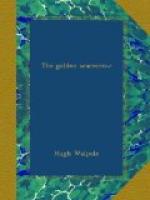With a sigh he translated himself back into this new, tiresome existence.
V
But after that morning things were never again quite the same. He gave himself up deliberately to the new life.
With that serious devotion towards anything likely to be of real practical value to him that was, in his later years, never to fail him, he attacked this business of “words.” He discovered that if he made certain sounds when certain things were said to him he provoked instant applause. He liked popularity; he liked the rewards that popularity brought him. He acquired a formula that amounted practically to “Wash dat?” And whenever he saw anything new he produced his question. He learnt with amazing rapidity. He was, his nurse repeatedly told his father, “a most remarkable child.”
It could not truthfully be said that during these weeks he forgot his friend altogether. There were still the dark hours at night when he longed for him, and once or twice he had cried aloud for him. But slowly that slipped away. He did not look often now at the fountain.
There were times when his friend was almost there. One evening, kneeling on the floor before the fire, arranging shining soldiers in a row, he was aware of something that made him sharply pause and raise his head. He was, for the moment, alone in the room that was glowing and quivering now in the firelight. The faint stir and crackle of the fire, the rich flaming colour that rose and fell against the white ceiling might have been enough to make him wonder. But there was also the scent of a clump of blue hyacinths standing in shadow by the darkened window, and this scent caught him, even as the fountain had caught him, caught him with the stillness, the leaping fire, the twisted sense of romantic splendours that came, like some magician’s smoke and flame, up to his very heart and brain. He did not turn his head, but behind him he was sure, there on the golden-brown rug, his friend was standing, watching him with his smiling eyes, his dark beard; he would be ready, at the least movement, to catch him up and hold him. Swiftly, Ernest Henry turned. There was no one there.
But those moments were few now; real people were intervening. He had no mother, and this was doubtless the reason why his nurse darkly addressed him as “Poor Lamb” on many occasions; but he was, of course, at present unaware of his misfortune. He had an aunt, and of this lady he was aware only too vividly. She was long and thin and black, and he would not have disliked her so cordially, perhaps, had he not from the very first been aware of the sharpness of her nose when she kissed him. Her nose hurt him, and so he hated her. But, as he grew, he discovered that this hatred was well-founded. Miss Wilberforce had not a happy way with children; she was nervous when she should have been bold, and secret when she




